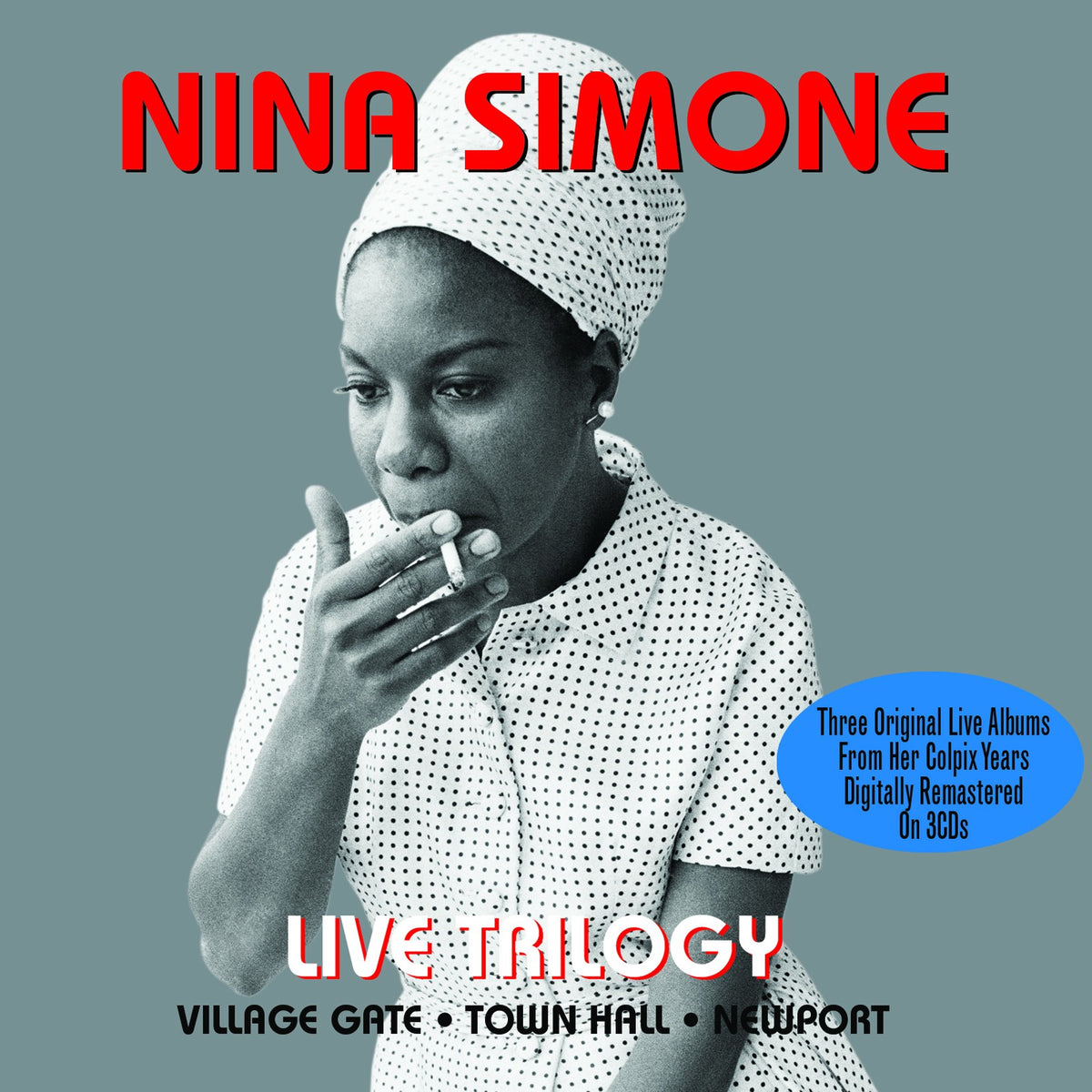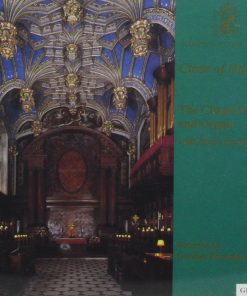NINA SIMONE: Live Trilogy (2 CDS) Not Now Music
$ 11,99 $ 7,19

Nina Simone was born Eunice Kathleen Waymon in North Carolina in 1933. One of a family of eight children, the young Eunice sang with her mother and sisters in church and demonstrated a talent at the piano even before having lessons. At seventeen she attended a summer course at the Juilliard School of Music in New York and, in order to pay for advanced piano lessons, became an accompanist for a singing teacher.
In 1954, she accepted a job as a pianist-singer in the Midtown Bar and Grill in Atlantic City, adopting the stage name Nina Simone. Nina was the pet name a boyfriend had given her.
Simone recorded a first album for Bethlehem Records, released in 1958. This was a great success, and the single from that recording, ‘I Loves You Porgy’/‘He Needs Me’, became a national rhythm and blues hit in the summer of 1959, selling over a million copies.
Thanks to the success of these first recordings, Simone signed with Colpix (Columbia Pictures Records) in 1959, beginning a collaboration that lasted until 1964. Nina recorded six studio and four live albums for Colpix.
The first live album, ‘Nina Simone At Town Hall’, forms our second CD. This is based on an appearance at New York Town Hall in September 1959, and was released in the December; some of the songs featured in the concert were re-recorded in the studio for the album. Here she covers both standards and originals in her expressive vocal style and shows off her tasteful piano-playing. ‘Under The Lowest’, an improvised blues, and ‘Return Home’, performed in Afro-Caribbean style, are Simone originals, while standout covers include George Gershwin’s ‘Summertime’, Billie Holliday’s ‘Fine And Mellow’ and the traditional ‘Black Is The Colour Of My True Love’s Hair’ which kicks off the album. Holliday was one of Simone’s idols, and she dedicated ‘Fine And Mellow’ to her.
One feature of this performance is that, although Simone is accompanied by the impeccable rhythm section of Jimmy Bond on bass and Al ‘Tootie’ Heath on drums, these instruments are secondary to the piano and the voice; the piano supports the vocals with minimal intrusion.
Nina’s third album for Colpix, ‘Nina Simone At Newport’, reached Number 23 in the Billboard chart in March 1961. Recorded live at the Newport Jazz Festival of the previous year, it opens with ‘Trouble In Mind’, Nina’s bluesy interpretation somewhat faster than the original jailhouse lament.
The ‘Porgy’ on this album is not the musical ‘Porgy’ of her first hit. The character is the same, but the music and lyrics are by Jimmy McHugh and Dorothy Fields. ‘Little Liza Jane’ is a rousing Negro folk song, while Nina takes Cole Porter’s ‘You’d Be So Nice To Come Home To’ smooth and easy.
‘Flo Me La’ is an authentic African song developed by pack bearers on safari as a rhythmic chant to set the walking pace; eventually, the chant became a song, the title meaning ‘Walking Along’. Nina begins the American traditional ‘In The Evening By The Moonlight’ with a restrained chorus, but it develops into a band climax to end the disc.
Nina is backed here by what had become her regular band. Chris White (bass) studied at the Manhattan School of Music, Bobby Hamilton (drums) studied with the famous Jim Chapin, and Al Schackman (guitar) was equally proficient in classical and flamenco. Schackman in particular became a lifelong friend, working as Nina’s musical director over many years. They played together from 1957, the other two joining shortly afterwards.
Our first CD showcases Nina’s fifth album with Colpix. Entitled ‘Nina At The Village Gate’ –the ‘Simone’ was now redundant, such was her reputation – this was recorded live at the lower-Manhattan café of the title in April 1961 and released in 1962. The material ranges from Broadway hit ‘Just In Time’ (from Bells Are Ringing) through folk music (‘House Of The Rising Sun’) to ‘Bye Bye Blackbird’, which receives as unique a treatment as this Twenties standard ever enjoyed.
In many ways, Simone’s music defied definitions. Her unique style fused gospel, folk and jazz with classical influences such as Bach, her favourite composer; her classical training showed through no matter what type of song she played.
The ‘High Priestess of Soul’ was a nickname she hated, and she preferred not to call herself a ‘jazz singer’ either. ‘If I had to be called something, it should have been a folk singer because there was more folk and blues than jazz in my playing,’ she wrote. She died in France, where she had settled in retirement, in 2003 after a long battle with breast cancer. She had a long, volatile career during which she was vociferous for civil rights and equal rights for black people. Most importantly, she influenced a generation of musicians.

CD 1 Nina At Village Gate
1. Just In Time
2. He Was Good To Me
3. House Of The Rising Sun
4. Bye Bye Blackbird (Instrumental)
5. Brown Baby
6. Zungo
7. If He Changed My Name
8. Children Go Where I Send You
CD 2 At Town Hall
1. Black Is The Color Of My True Love’s Hair
2. Exactly Like You
3. The Other Woman
4. Under The Lowest
5. You Can Have Him
6. Summertime (Instrumental)
7. Summertime (Vocal)
8. Cotton-Eyed Joe
9. Return Home
10. Wild Is The Wind
11. Fine And Mellow
CD 3 At Newport
1. Trouble In Mind
2. Porgy
3. Little Liza Jane
4. You’d Be So Nice To Come Home To
5. Flo Me La
6. Nina’s Blues
7. In The Evening By The Moonlight
Fast Shipping and Professional Packing
Due to our longstanding partnership with UPS FedEx DHL and other leading international carriers, we are able to provide a range of shipping options. Our warehouse staff are highly trained to pack your goods exactly according to the specifications that we supply. Your goods will undergo a thorough examination and will be safely packaged prior to being sent out. Everyday we deliver hundreds of packages to our customers from all over the world. This is an indication of our dedication to being the largest online retailer worldwide. Warehouses and distribution centers can be located in Europe as well as the USA.
Orders with more than 1 item are assigned processing periods for each item.
Before shipment, all ordered products will be thoroughly inspected. Today, most orders will be shipped within 48 hours. The estimated delivery time is between 3-7 days.
Returns
The stock is constantly changing. It's not entirely managed by us since we are involved with multiple parties such as the factory and our storage. The actual stock can fluctuate at any time. Please understand it may happen that your order will be out of stock when the order is placed.
Our policy is valid for 30 days. If you haven't received your product within 30 days, we're not able to issue either a return or exchange.
You are able to return a product if it is unused and in the same condition when you received it. It must also still remain in the original packaging.
























































